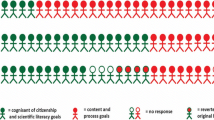Abstract
With the goal of producing scientifically literate citizens who are able to make informed decisions and reason critically when science intersects with their everyday lives, the National Research Council (NRC) has produced two recent documents that call for a new approach to K-12 science education that is based on scientific practices, crosscutting concepts, and disciplinary core ideas. These documents will potentially influence future state standards and K-12 curricula. Teachers will need support in order to teach science using a practices based approach, particularly if they do not have strong science backgrounds, which is often the case with elementary teachers. This study investigates one cohort (n = 19) of preservice elementary teachers’ ideas about scientific practices, as developed in a one-semester elementary science teaching methods course. The course focused on eight particular scientific practices, as defined by the National Research Council’s A Framework for K-12 Science Education: Practices, Crosscutting Concepts, and Core Ideas (2012). Participants’ written reflections, lesson plans and annotated teaching videos were analyzed in fine detail to better understand their ideas about what it means to engage in each of the practices. The findings suggest that preservice elementary teachers hold promising ideas about scientific practices (such as an emphasis on argumentation and communication between scientists, critical thinking, and answering and asking questions as the goal of science) as well as problematic ideas (including confusion over the purpose of modeling and the process of analysis, and conflating argumentation and explanation building). These results highlight the strengths and limitations of using the Framework (NRC 2012) as an instructional text and the difficulties of differentiating between preservice teachers’ content knowledge about doing the practices and their pedagogical knowledge about teaching the practices.
Similar content being viewed by others
Notes
References
Berland, L. K., & McNeill, K. L. (2012). For whom is argument and explanation a necessary distinction? A response to Osborne and Patterson. Science Education, 96(5), 808–813.
Berland, L. K., & Reiser, B. J. (2008). Making sense of argumentation and explanation. Science Education, 93(1), 26–55.
Bowen, G. M., & Roth, W. M. (2005). Data and graph interpretation practices among preservice science teachers. Journal of Research in Science Teaching, 42(10), 1063–1088.
Braaten, M., & Windschitl, M. (2011). Working toward a stronger conceptualization of scientific explanation for science education. Science Education, 95(4), 639–669.
Braun, V., & Clarke, V. (2006). Using thematic analysis in psychology. Qualitative Research in Psychology, 3(2), 77–101.
Charmaz, K. (2006). Constructing grounded theory: A practical guide through qualitative analysis. Thousand Oaks: Pine Forge Press.
Davis, E. A., Petish, D., & Smithey, J. (2006). Challenges new science teachers face. Review of Educational Research, 76(4), 607–651.
Glaser, B. G., & Strauss, A. L. (1967). The discovery of grounded theory: Strategies for qualitative research. New Brunswick: Aldine.
Harrison, A. G. (2001). Models and PCK: Their relevance for practicing and pre-service teachers. Paper presented at the annual meeting of the National Association of Research in Science Teaching. St. Louis, MO.
Justi, R. S., & Gilbert, J. K. (2002). Modeling, teachers’ views on the nature of modeling, and implications for the education of modelers. International Journal of Science Education, 24(4), 369–387.
Lave, J., & Wenger, E. (1991). Situated learning: Legitimate peripheral participation. Cambridge: Cambridge University Press.
National Research Council. (2007). Taking science to school: Learning and teaching science in grades K-8. Committee on science learning, kindergarten through eighth grade. In Duschl, R. A., Schweingruber, H. A., & Shouse, A. W. (Eds.) Board on science education, center for education. Division of behavioral and social sciences and education. Washington, DC: The National Academies Press.
National Research Council. (2012). A framework for K-12 science education: Practices, crosscutting concepts, and core ideas. Committee on a conceptual framework for new K-12 Science Education Standards. Board on science education, Division of behavioral and social sciences and education. Washington, DC: The National Academies Press.
NGSS Lead States. (2013). Next generation science standards: For states, by states. Washington, DC: The National Academies Press.
Osborne, J. F., & Patterson, A. (2011). Scientific argument and explanation: A necessary distinction? Science Education, 95(4), 627–638.
Osborne, J., & Patterson, A. (2012). Authors’ response to “For whom is argument and explanation a necessary distinction? A response to Osborne and Patterson” by Berland and McNeill. Science Education, 96(5), 814–817.
Schwarz, C. (2009). Developing preservice elementary teachers’ knowledge and practices through modeling-centered scientific inquiry. Science Education, 93(4), 720–744.
Smith, D. C., & Anderson, C. W. (1999). Appropriating scientific practices and discourses with future elementary teachers. Journal of Research in Science Teaching, 36(7), 755–776.
Toulmin, S. (1958). The uses of argument. Cambridge: Cambridge University Press.
Van Driel, J. H., De Jong, O., & Verloop, N. (2002). The development of preservice chemistry teachers’ pedagogical content knowledge. Science Education, 86(4), 572–590.
Windschitl, M., & Thompson, J. (2006). Transcending simple forms of school science investigation: The impact of preservice instruction on teachers’ understandings of model-based inquiry. American Educational Research Journal, 43(4), 783–835.
Yin, R. K. (2009). Case study research: Design and methods (4th ed.). Los Angeles: Sage.
Zembal-Saul, C. (2009). Learning to teach elementary school science as argument. Science Education, 93(4), 687–719.
Zembal-Saul, C., McNeill, K. L., & Hershberger, K. (2012). What’s your evidence? Engaging K-5 students in constructing explanations in science. Boston: Pearson.
Zembal-Saul, C., Munford, D., Crawford, B., Friedrichsen, P., & Land, S. (2002). Scaffolding preservice science teachers’ evidence-based arguments during an investigation of natural selection. Research in Science Education, 32(4), 437–463.
Author information
Authors and Affiliations
Corresponding author
Rights and permissions
About this article
Cite this article
Ricketts, A. Preservice Elementary Teachers’ Ideas About Scientific Practices. Sci & Educ 23, 2119–2135 (2014). https://doi.org/10.1007/s11191-014-9709-7
Published:
Issue Date:
DOI: https://doi.org/10.1007/s11191-014-9709-7




